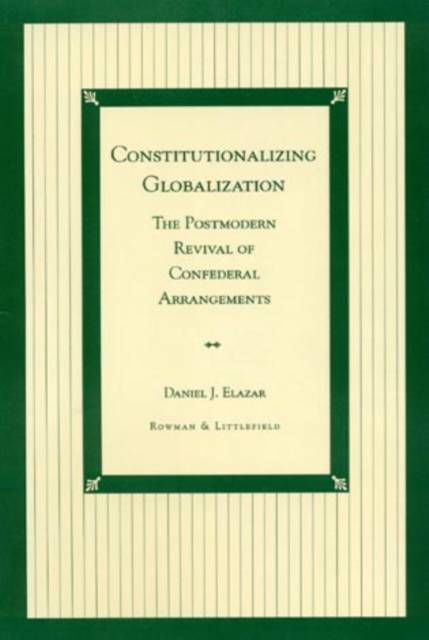
- Afhalen na 1 uur in een winkel met voorraad
- Gratis thuislevering in België vanaf € 30
- Ruim aanbod met 7 miljoen producten
- Afhalen na 1 uur in een winkel met voorraad
- Gratis thuislevering in België vanaf € 30
- Ruim aanbod met 7 miljoen producten
Zoeken
€ 103,45
+ 206 punten
Omschrijving
Constitutionalizing Globalization explores two converging trends: the spread of federalism and federal arrangements around the world, and the globalization taking place on the international scene. Daniel Elazar shows how globalization of the economy and the concern for global human rights bring with them the need for development of a constitutional order that will control both. The gradual development of appropriate constitutional mechanisms and controls are part of a general shift from modern statism to post-modern federalism. The reliance on the sovereignty of the nation state, which marked the era from the Treaty of Westphalin in 1648 to the end of World War II, gave way to the beginning of a world order which, while built on states, links those states in various ways through enforceable constitutional bonds. These trends have been recognized by both students of federalism and students of international relations. Constitutionalizing Globalization is the first book to join the perspectives of both in order to explain the new paradigm. It is important reading for students and scholars of constitutional issues, federalism, and international relations.
Specificaties
Betrokkenen
- Auteur(s):
- Uitgeverij:
Inhoud
- Aantal bladzijden:
- 256
- Taal:
- Engels
- Reeks:
Eigenschappen
- Productcode (EAN):
- 9780847687886
- Verschijningsdatum:
- 12/03/1998
- Uitvoering:
- Paperback
- Formaat:
- Trade paperback (VS)
- Afmetingen:
- 156 mm x 228 mm
- Gewicht:
- 353 g

Alleen bij Standaard Boekhandel
+ 206 punten op je klantenkaart van Standaard Boekhandel
Beoordelingen
We publiceren alleen reviews die voldoen aan de voorwaarden voor reviews. Bekijk onze voorwaarden voor reviews.











